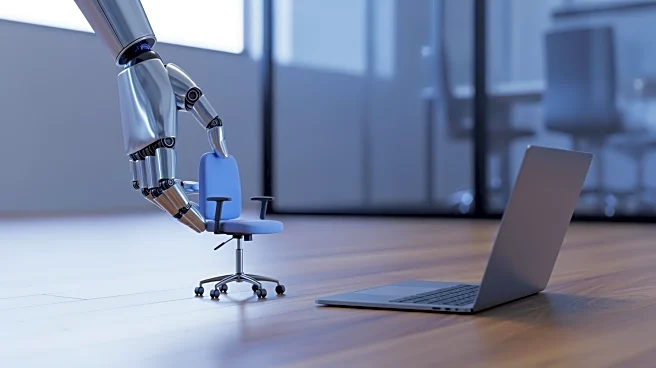What's Happening?
The rapid integration of artificial intelligence into the workforce is significantly impacting the availability of entry-level positions for new graduates. According to recent reports, large employers
are increasingly replacing human workers with AI to streamline operations and reduce costs. This shift is contributing to a challenging job market for graduates, with fewer positions available and a reduced hiring outlook. The National Association of Colleges and Employers reports that 51% of employers rate the job market for college seniors as poor or fair, the highest since 2020-21. The technology sector, in particular, is experiencing high levels of layoffs due to AI integration, affecting jobs that require analytical skills. Meanwhile, nursing and blue-collar jobs remain more insulated from AI disruption.
Why It's Important?
The integration of AI into the workforce has broad implications for the U.S. economy and higher education institutions. As AI replaces certain skill sets, colleges face increased pressure to demonstrate the return on investment of their programs. This situation is exacerbated by rising college costs and student loan debt, leading to a crisis of confidence in higher education. Students and their families are increasingly concerned about job prospects post-graduation, prompting colleges to enhance career-readiness programs. The shift towards AI-driven operations could lead to a 'talent doom cycle,' where the lack of entry-level positions hampers the development of future industry leaders.
What's Next?
Colleges and universities are likely to intensify efforts to provide career-connected experiences, such as internships and apprenticeships, to improve graduate employability. Institutions like the City University of New York are already implementing programs to integrate career advising and industry collaborations across academic concentrations. As AI continues to reshape the job market, educational institutions may need to adapt their curricula to better align with evolving industry needs. Additionally, smaller colleges may face challenges compared to urban institutions with closer ties to major employers.
Beyond the Headlines
The ethical implications of AI replacing human workers are significant, raising questions about the future of work and the value of human skills. The reliance on AI could lead to a reduction in human interaction and tacit knowledge, which are crucial for maintaining company culture and performance. Furthermore, the shift may exacerbate economic inequality, as higher-paying jobs become more susceptible to AI disruption, while lower-paying, manual jobs remain insulated.









